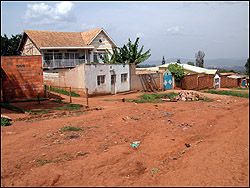|
Less than two miles from the UNDP's Kigali compound is the township of Nyamirambo, a teeming area of shops, open markets and crowded neighborhoods that reach up to green rolling hills. Hutus and Tutsis lived close together in Nyamirambo. Many families intermarried. Two days into the genocide, the Interahamwe swept through Nyamirambo massacring Tutsis and moderate Hutus.
"Semana" (who asked that his real name not be used for this report for fear of retaliation) is a 33-year-old Hutu carpenter who was given a club and ordered to kill any Tutsi he came across. Like many ordinary Hutus who took part in the genocide, Semana claims there was no way to resist the Interahamwe.
"Among us, there were two kinds of people. There were some who went because we felt we did not have much choice, that we were safer with the militia. Then there were people who really wanted to be there, those who had a desire to kill and who kept count of the dead Tutsis. "
Among the men leading the killing, Semana includes Callixte Mbarushimana. Semana knew him prior to the genocide because he says both men were active in the extremist Hutu power movement. He says Mbarushimana's prestigious position with the U.N. was also well known in Nyamirambo.
 | Zuzu's house. It was on this street that many Tutsis from the Nyamirambo neightborhood were murdered.
photo by Stephen Smith |
Semana says during the genocide, Mbarushimana oversaw dozens of barricades set up in the neighborhood to catch Tutsis. He says Mbarushimana and another militia chief, known as Zuzu, also led death squads into houses where Tutsis were murdered.
"Callixte was a very vicious and cruel man. He had lists and would direct the militia to homes. Most everyone in this area was killed under Callixte's orders," says Semana.
Semana's allegations are supported by accounts from four other men interviewed later by U.N. war crimes investigators. American RadioWorks and FRONTLINE obtained their signed witness statements on the condition that the men's identities be protected.
In a written statement released by his attorneys, Mbarushimana confirmed that during the genocide, he lived with his family in Nyamirambo in a location identified by Semana and other witnesses. Mbarushimana rejected allegations that he was involved in killings in Nyamirambo as "untrue and improperly motivated." Mbarushimana said he, too, was victimized by government soldiers, and braved dozens of militia barricades in order to report to work at the UNDP compound.
|

